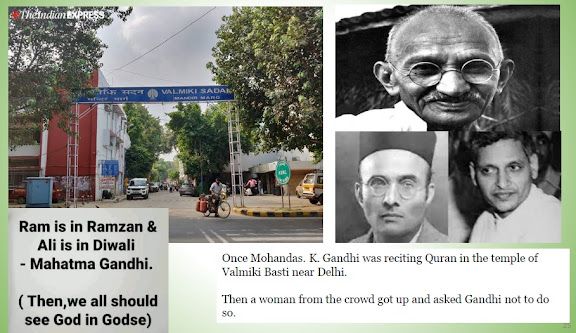The Bhagavad Gita – Three Fold Aspects of Faith
 Three
Characteristics nature (Gunas) of Human Beings are the deciding factor about
the qualities of life, behaviours and outlooks. Sri Bhagavan urges all to reach
the level of Sattva i.e. goodness as against Rajas (passion) and Tamas
(ignorance). The definitions, classifications and grades of all these three
gunas are found explained in detail and in a very simple language. Actually,
three Chapters – 14, 17 and 18 are exclusively devoted for this purpose. Lord
Krishna has declared that three Gunas bind soul to the body and the liberation
will come only on conquering them. To attain salvation – i.e. birth less state
or union with the Supreme Being or God, one should know the methods of life in
respect of Faith, Food, Sacrifice, Austerity, Gift. One should also know the
austerities pertaining to body, speech and mind. Having understood, realised
and practised the best amongst the above three Gunas, the realisation of
Brahman – “Om Tat Sat” – combination of action, abandonment of fruits of action
and faith is achieved and the soul becomes thus liberated.
Three
Characteristics nature (Gunas) of Human Beings are the deciding factor about
the qualities of life, behaviours and outlooks. Sri Bhagavan urges all to reach
the level of Sattva i.e. goodness as against Rajas (passion) and Tamas
(ignorance). The definitions, classifications and grades of all these three
gunas are found explained in detail and in a very simple language. Actually,
three Chapters – 14, 17 and 18 are exclusively devoted for this purpose. Lord
Krishna has declared that three Gunas bind soul to the body and the liberation
will come only on conquering them. To attain salvation – i.e. birth less state
or union with the Supreme Being or God, one should know the methods of life in
respect of Faith, Food, Sacrifice, Austerity, Gift. One should also know the
austerities pertaining to body, speech and mind. Having understood, realised
and practised the best amongst the above three Gunas, the realisation of
Brahman – “Om Tat Sat” – combination of action, abandonment of fruits of action
and faith is achieved and the soul becomes thus liberated.
Please read on ……….
There
are persons who offer worship full of devotion or faith, but without observing
scriptural injunctions while doing so. Of what nature is their faith? Is it
born of goodness (Sattva), passion (Rajas) or ignorance (Tamas)?
Sri Bhagavan said:
Faith,
Food, Sacrifice or Worship, Austerity or Penance and Charity or Gift differ as
per their modes of material nature (Gunas). Hence, there are three kinds of
each of them.
The
faith of all men depends upon their past births.
The
faith of the human being is of three kinds – viz. sattva, rajas or tamas.
Sattvika men worship the god, Rajasika men worship demi-god and demons and the
Tamasika men worship the dead and the groups of ghosts.
The
persons of demonic nature are those who practice terrible mortifications
contrary to scriptural injunctions impelled by the forces of lust, pride of
power and attachment. As fools, they torture their own bodies and thereby Me
dwelling in them.
Sattvika
men like foods that promote longevity, virtue, strength, health, happiness and
joy and such foods are juicy, soft, nourishing and agreeable. Rajasika men like
foods that are bitter, sour, salty, excessively heating, pungent, dry and
burning and that cause pain, grief and disease. Tamasika men like foods that
are stale, tasteless, stinking, cooked overnight, refuse and impure.
Sacrifice
or selfless service that is performed as enjoined by the scriptures without the
attachment for the fruits, with the mind fixed on the service only, is Sattvika
in character. Selfless service that is performed in expectation of reward or
for self-glorification is Rajasika in character. Selfless service that is
performed without following the scripture, in which no food is distributed,
which is devoid of mantra, faith and gift, is Tamasika in character.
Austerities
are of three kinds pertaining to body, speech and mind. Worship of Gods,
teachers and wise are said to be austerity of the body. The speech, which causes no excitement, which
is truthful, pleasant and beneficial, and the practice of sacred recitation –
are said to form the austerity of speech. Serenity of mind, gentleness,
silence, self-control and purity of thought – is called the austerity of the mind.
These austerities can be classified under Sattvika, Rajasika and Tamasika
depending upon their qualities. Austerity performed without any desire for the
fruit is called Sattvika, while performed for gaining respect, honour and
reverence is Rajasika in nature. The austerity performed with a foolish
obstinacy, with self-torture or for the purpose of destroying another, is
declared to be Tamasika.
Gift
which is made out of a sheer sense of duty, without expectation of any kind of
return, at the proper time and place, to a fit recipient, is said to be of
the
nature of Sattvika. Gift which is given with a view to receive in return, or
looking for the fruit, or again grudgingly, is accounted as Rajasika. Gift
given at a wrong place or time, to unworthy persons, without respect or with
insult - is declared to be Tamasika.
The
triple designation of Brahman is “Om, Tat, Sat”.




Comments